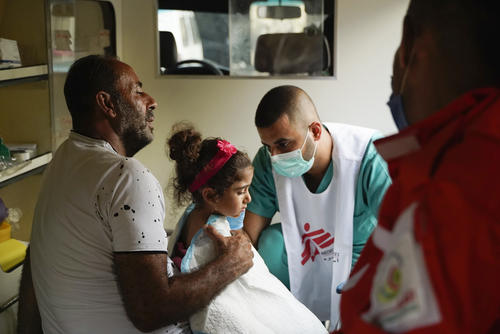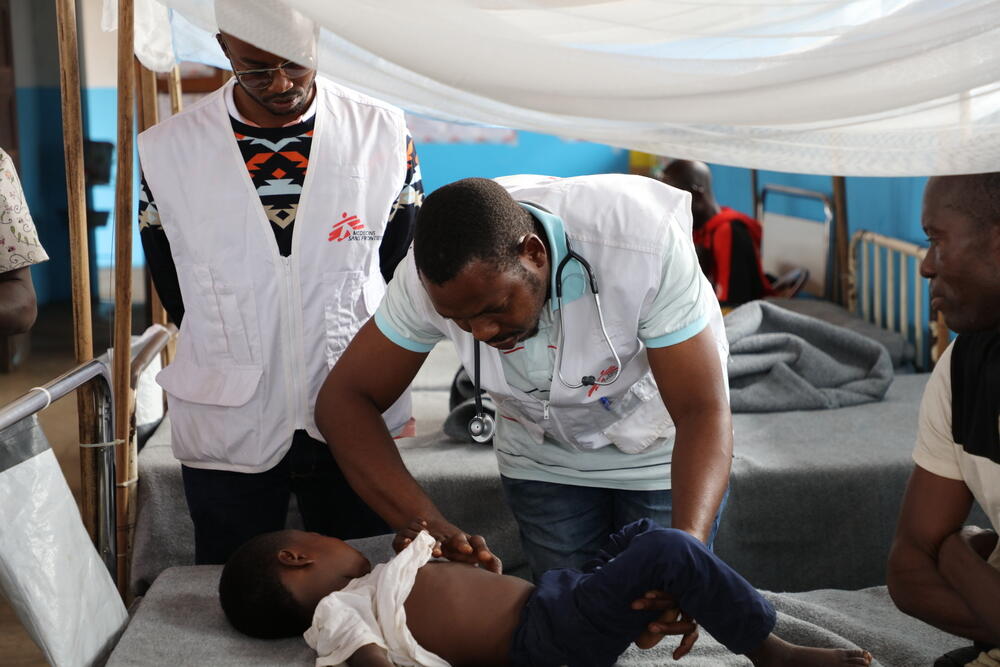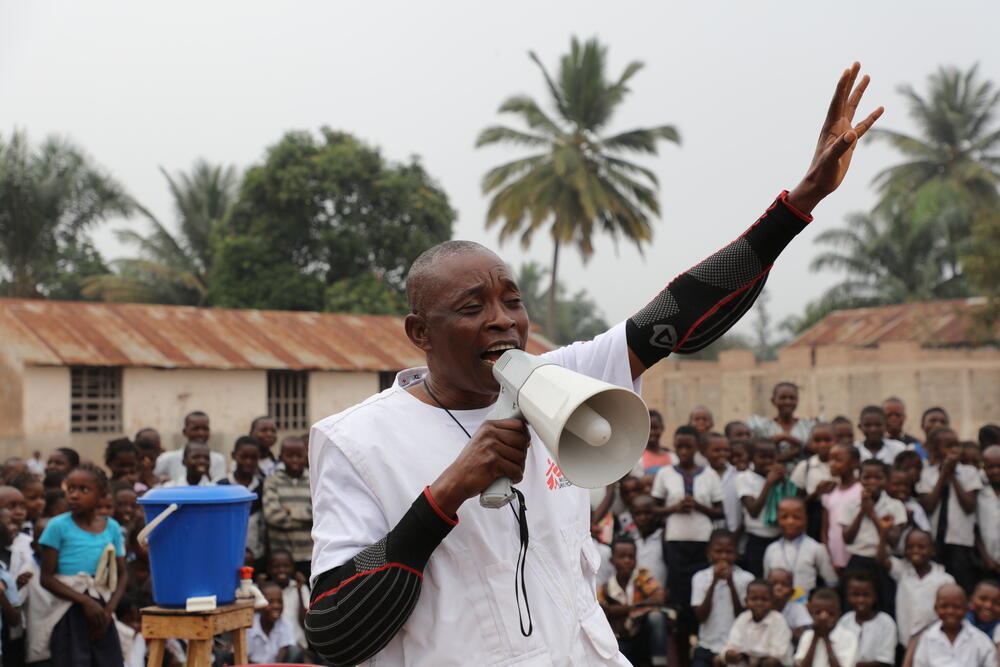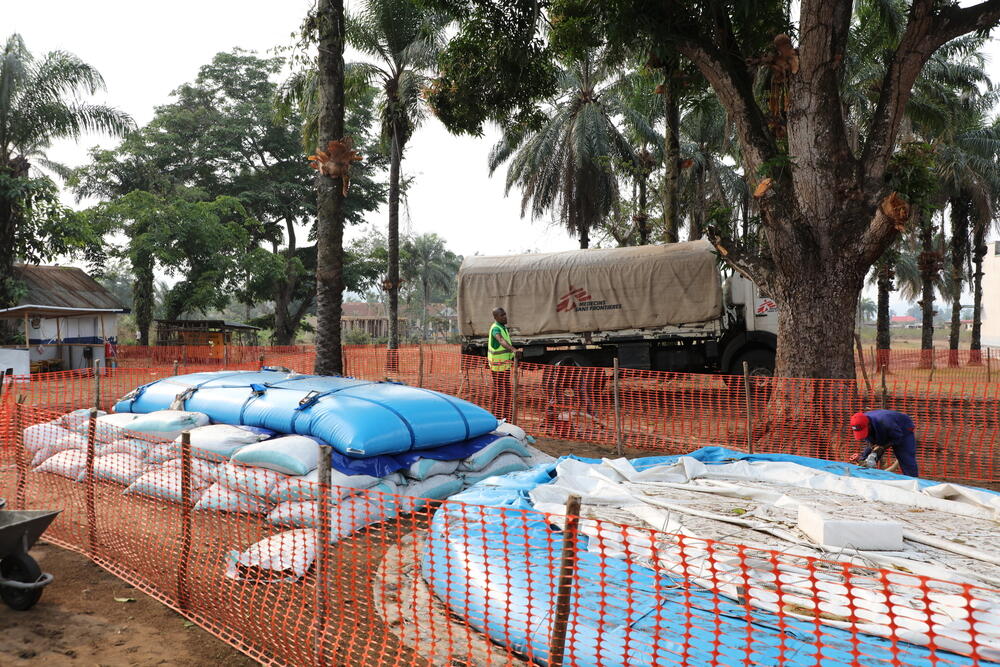Typhoid fever: MSF emergency teams tackle outbreak in DRC
Nestled in the hills at the confluence of three rivers, Popokabaka is nearly 250 miles southeast of the Democratic Republic of Congo's capital, Kinshasa. For months, it has also been the centre of an outbreak of a deadly disease – typhoid fever.
“Our team was called to respond in Popokabaka after the authorities confirmed the epidemic,” says Jean-Marc Mavunda, medical manager of MSF’s emergency team.
“But all indications were that the disease had already been present for several months and had already claimed many lives.”
Typhoid fever: explained
Typhoid fever is usually spread either by ingesting food or water contaminated with human faeces and secretions or through close contact.
The main symptoms of typhoid are a prolonged fever, a headache and digestive problems including stomach pains, vomiting and diarrhoea.
Once diagnosed, typhoid is treatable in just a few days with antibiotics. However, identifying it in the first place can be difficult as the symptoms are so similar to other conditions. This is particularly difficult to do in local healthcare centres, as laboratory tests are needed to confirm the disease.
When diagnosis and treatment is delayed, typhoid can lead to serious complications and even death.
“How do you expect us to avoid the disease?”
This morning, Chadrac Mbaya is sitting next to his one-year-old daughter La Joie. La Joie was admitted to Popokabaka Hospital four days ago with symptoms of typhoid.
“One night she started vomiting and having diarrhoea,” says her father.
“We went to the health centre, but the treatment she received did not improve her condition. She ended up being transferred here. Her sister also had the disease, but fortunately she recovered.”
People’s living conditions in Popokabaka mean that outbreaks of waterborne diseases are common. There is limited access to clean drinking water, while sanitation facilities are almost non-existent in most residents’ homes.
“In this area, people drink water from the river, where we also bathe and clean the dishes,” says Chadrac.
“How do you expect us to avoid the disease?”
Working with communities
To reduce people’s risk of catching the disease as they go about their daily life, MSF health promoters have held awareness sessions about typhoid fever in schools, healthcare facilities, and across the community.
Meanwhile, our epidemiology teams have tracked the course of the disease throughout the area in order to respond quickly and effectively.
“In addition to support for care and sensitisation [of the community], we conducted epidemiological surveillance of the entire zone in order to adapt our response to the evolving situation,” says Mavunda.
“This work quickly revealed that the number of cases was much higher than initially estimated. Every day, the hospital was receiving patients with typhoid fever referred from peripheral health centres.
“In total, it is estimated that more than 3,700 people have been affected since the beginning of the year.”
Complications and surgery
Endemic in sub-Saharan Africa, typhoid can cause serious complications in 10 to 15 percent of patients, including digestive haemorrhage, intestinal perforation and peritonitis (abdominal inflammation), all of which require surgery.
“Given the number of complicated cases in the area, we directly integrated a surgical component into our response,” says Mavunda.
“We've dealt with a lot of cases of peritonitis, which is a serious infection that can easily lead to death. Acute peritonitis sometimes requires multiple operations on the same patient.
“Before MSF launched its response, 29 in-hospital deaths had been reported, almost all of them post-operative. Providing surgical support and post-operative care was therefore fundamental.”
Medical care where it's needed most
Help us care for people caught in the world's worst healthcare crises.

Multiple operations
Eleven-year-old Tharcisse developed complications from typhoid and has already had four visits to the operating theatre.
“The first three operations were performed last May and June,” says his father, also called Tharcisse.
“After the first two, the situation had not improved. I was about to take him to Kinshasa to be treated there, but when I heard that the MSF team had arrived, I decided to wait. And it was the MSF team that organised the rest of the operations.”
Three-year-old Mabweni also had to be operated on a second time after he was admitted to Popokabaka Hospital experiencing complications from typhoid.
“He had his first operation on 4 July,” says his father Julva.
“Three days later, there were other complications and he had to go through another operation. This has been done and we are waiting for him to recover to go home.”
From mid-July to mid-September, 2,180 patients were treated and 20 surgical operations were performed with MSF’s support.
In addition to treating typhoid fever, the MSF team also operated on 11 people for other surgical emergencies and treated more than 3,500 patients suffering from simple and severe malaria.
Rainy season
Cases of typhoid fever are now decreasing, allowing the MSF team to respond to emergencies elsewhere in the country. Still, staff at healthcare facilities across the region will need to be vigilant in the coming weeks.
Water, hygiene and sanitation – the main factors in the spread of typhoid fever – are still far below what is needed in the Popokabaka area, and the onset of the rainy season could lead to an increase in cases.
Before heading elsewhere, the MSF emergency team donated medicines, medical and surgical equipment to Popokabaka Hospital to strengthen care. However, a more structural response is needed to improve people’s living conditions and tackle the disease at its source.
MSF in the Democratic Republic of Congo
The second-largest country in Africa by area, the Democratic Republic of Congo (DRC) is rich in resources but plagued by conflict. It has endured decades of multiple overlapping crises and severe limitations in medical capacity.
Médecins Sans Frontières/Doctors Without Borders (MSF) runs some of its largest programmes in DRC, working in 16 of the country’s 26 provinces.
We provide services ranging from basic healthcare and nutrition to treatment for victims of sexual violence and people living with HIV/AIDS. In 2020, we responded to DRC’s largest measles epidemic and two simultaneous outbreaks of Ebola, in addition to COVID-19, which had claimed 591 lives by the end of the year.



